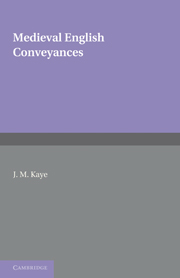Book contents
- Frontmatter
- Contents
- Preface
- Abbreviations and references
- List of year book cases
- Introduction
- 1 Common clauses in deeds
- 2 Grants in fee: general
- 3 Grants in fee: special cases
- 4 Grants in marriage, limited fee and fee tail
- 5 Grants in alms
- 6 Women's realty
- 7 Confirmations
- 8 Grants for life and for lives
- 9 Grants for terms of years
- 10 Rents
- 11 Exchanges
- 12 Surrenders and releases
- 13 Villeins and their lands
- Glossary of legal terms
- Select Bibliography
- Index
3 - Grants in fee: special cases
Published online by Cambridge University Press: 29 January 2010
- Frontmatter
- Contents
- Preface
- Abbreviations and references
- List of year book cases
- Introduction
- 1 Common clauses in deeds
- 2 Grants in fee: general
- 3 Grants in fee: special cases
- 4 Grants in marriage, limited fee and fee tail
- 5 Grants in alms
- 6 Women's realty
- 7 Confirmations
- 8 Grants for life and for lives
- 9 Grants for terms of years
- 10 Rents
- 11 Exchanges
- 12 Surrenders and releases
- 13 Villeins and their lands
- Glossary of legal terms
- Select Bibliography
- Index
Summary
GRANTS OF SEIGNORIES
Seignory denotes the bundle of rights which a lord retained after making a subinfeudation in fee to a freehold tenant, that is, the right to the tenant's services, the right to take the benefit of whatever incidents were attached to the form of tenure by which the tenant held, and the power to enforce all these things by distraint and the bringing of appropriate actions. A seignory was an incorporeal hereditament and could therefore be transferred only by deed or final concord. Bracton and the other treatise-writers of the thirteenth century thought that a final concord was preferable to a charter because it carried with it a procedure for compelling an unwilling tenant to acknowledge the services he owed to his new lord. The procedure was subject to certain conditions and rules which do not need to be discussed here. If a tenant was willing to have his services transferred, he could join in the fine together with his lord and the grantee, and in this case he would be automatically attorned to the grantee without the need for any further action. From the fact that many grants of seignories were made by charter it can be assumed that many tenants did not object to the transfer of their services to new lords, and indeed some grantors recited that their grants were made with the consent, or even at the request, of the tenants.
- Type
- Chapter
- Information
- Medieval English Conveyances , pp. 99 - 133Publisher: Cambridge University PressPrint publication year: 2009

